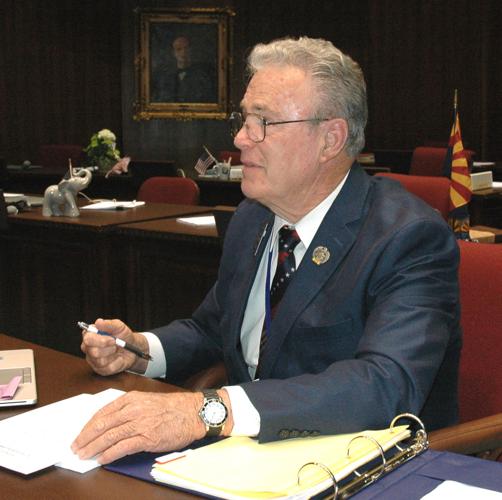PHOENIX — Stunned by the governor’s veto, some lawmakers are already exploring new attempts to get an increase in their living allowances.
And one question is whether rural legislators, who the governor said are clearly entitled to more, should throw their more numerous Phoenix-area counterparts over the side.
The legislation Gov. Doug Ducey vetoed Friday would have pegged the allowance for out-county lawmakers at what the U.S. General Services Administration allows for travel to Phoenix. That figure is now $185 a day.
It also would have kept the current practice of paying allowances seven days a week, regardless of how many days the Legislature is in session, under the premise that rural lawmakers need to rent or buy a second residence.
“There’s some of our members that were really counting on that to help them get through the cost of serving,” said Senate President Karen Fann, R-Prescott.
“Expenses have just gotten so ridiculously high just trying to find a place to live temporarily,” she said.
That includes not just the legislative session, which runs from January into at least April, but the times that lawmakers need to be at the Capitol the rest of the year for hearings and meetings.
Rep. Noel Campbell, R-Prescott, who sponsored the House version of the increase Ducey vetoed, said this isn’t about lawmakers lining their pockets.
“We have members that are living in motor homes in not-very-nice locations. And it’s all because of inflation,” he said, pointing out the allowance of $60 a day for rural lawmakers and $35 for Maricopa County legislators has not been adjusted since 1984.
Both want to make another run at the issue when the Legislature reconvenes in January. The form remains under debate.
Ducey apparently had no problem with more cash for out-county lawmakers, saying there is “a strong case to be made for ensuring we are appropriately recognizing what is required for them to be here at the state Capitol in Phoenix during session.”
But the vetoed bill also would have given a half allowance — $92.50 a day, seven days a week — to in-county lawmakers. Unable to veto just part of the measure, Ducey rejected the whole plan.
“Next year, we’ll try something different,” said Fann. But she isn’t ready to say that the new version should be narrowed to only those who don’t live in Maricopa County.
The idea of jettisoning an allowance hike for urban lawmakers to get Ducey’s signature on a bill definitely annoyed Campbell, however.
“I don’t like the divide-and-conquer thing,” he said. “That’s not good politics.”
What it also may not be is a winning strategy.
There are 53 lawmakers who live in Maricopa County versus 27 who come to the Capitol from the other 14 counties.
That means it will take at least some of their votes for rural lawmakers to get the allowance boost they say they need.
Lawmakers are paid $24,000 a year. That’s a figure over which they have no control, as it is up to a special commission to make recommendations and up to voters to approve.
Their last pay raise was in 1998.
Rep. Jay Lawrence, R-Scottsdale, who voted for the allowance increase, said that figure should be $36,000 a year. But that was specifically rejected by voters in prior years, as was a scaled-back proposal for $30,000.
“In California, they get over $100,000 a year, plus automobiles, plus, plus, plus,” in addition to $192 a day in per diem, Lawrence said. “So, yeah, I believe we deserve more money because it’s an all-year job.”
Campbell said the lack of what he believes is proper compensation rankles some of his colleagues.
“It just shows us they don’t think much about us, they don’t consider the needs that we have,” he said. “And, the truth of it is, nobody’s looking out for us except ourselves.”
But Rep. Charlene Fernandez, D-Yuma, said she doubts voters will approve a higher salary “as long as we continue to act the way we do.”
She said there were days in the just-completed session where the Republican majority, missing one or two key members whose votes they needed, would let the whole day go by without voting on matters.
As for trying again next year with a higher allowance just for the out-county lawmakers, “I would be perfectly OK with that,” said Sen. Eddie Farnsworth, R-Gilbert, who supported the vetoed plan.
Rep. Travis Grantham, R-Gilbert, opposed the allowance increase, calling the action at the end of the session “poor timing.”
But Grantham said lawmakers should not be in any rush to ignore the needs of in-county legislators like himself.
He said even they have expenses that can exceed $35 a day, though he said that perhaps the $92.50 was not the right number.
Rep. Randy Friese, D-Tucson, who would benefit from an increase to out-county lawmakers, said he sees no reason not to provide some financial relief to his Maricopa County counterparts.
“There is some expense to meals,” he said, whether the lawmaker is living in town year- round or has an apartment here for the session. What may need to be debated, said Friese, is the proper figure.
Friese said he doesn’t necessarily see the governor’s veto as an outright rejection of more money for Maricopa lawmakers.
He pointed out that Ducey also expressed unhappiness that the increase would have taken effect this year, benefiting the lawmakers who voted for it and whose terms run through 2020. Friese said an increase with a delayed effective date — not until 2021 — may be more palatable.





